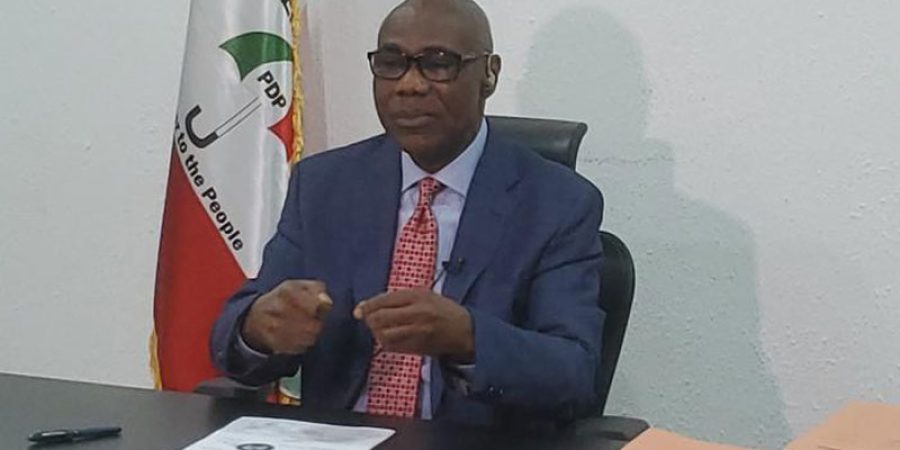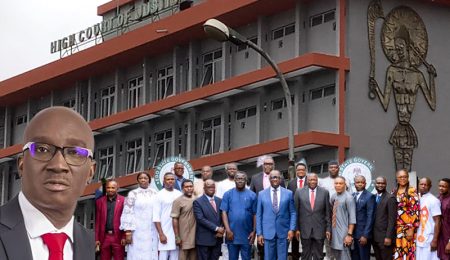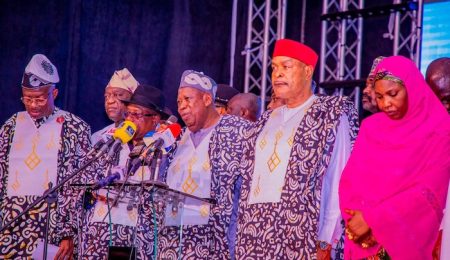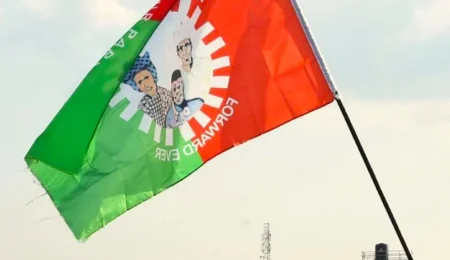The Peoples Democratic Party (PDP) on Wednesday described the N47.9 trillion 2025 federal government’s Appropriation Bill presented by President Bola Tinubu to the National Assembly as anti-people, which if implemented could plunge the nation deeper into the abyss of insecurity, poverty and hopelessness.
Also reacting to the 2025 Appropriation Bill, Secretary General, Coalition of Opposition Political Parties (CUPP), Peter Ameh, described the fiscal document as a stark reminder of the country’s persistent fiscal woes.
The PDP in a statement by its National Publicity Secretary, Debo Ologunagba, asserted that the proposed budget as presented further confirmed the insensitivity of the Tinubu-led All Progressives Congress (APC) administration towards the plight of Nigerians.
He said the proposed fiscal document made no meaningful provisions and investments for critical productive sectors of agriculture and food production, electricity, petroleum and gas, and small businesses which are the real drivers of the national economy.
The PDP stated that the budget presentation by the president sounded more like a campaign rhetoric laced with unsubstantiated economic statistics, false promises and conjured performance claims without clear-cut operable steps and mechanisms to address insecurity.
It also said there were no cogent plans to resuscitate the economy, revamp ailing industries, shore up food production, increase the value of the Naira, reduce overall cost of living, create jobs for youths and guarantee better living standards for citizens.
According to Ologunagba: ”President Tinubu dashed the hope of millions of suffering Nigerians who expected him to use the 2025 budget to make strategic provisions that will lead to the reduction in the cost of fuel, food items, electricity tariff and other essential goods and services that have direct bearing on the wellbeing of the people.
He added: ”The PDP is dismayed that instead, the budget speech was an assault on the sensibility of Nigerians when Mr. President claimed that the 2024 budget recorded a bogus 85 per cent performance without a breakdown of the component between recurrent and capital expenditure.
”Further distressing is President Tinubu’s claim that the economy improved under his watch even in the face of acute poverty, excruciating hardship, comatose infrastructure, collapsed productive sectors, deteriorating value of the Naira, alarming 34.6 per cent inflation and 40 per cent unemployment rates in the last 18 months as validated by official figures.
”Equally ludicrous is Mr. President’s voodoo economy claim that the 2025 budget will reduce the current inflation rate from 34.6 per cent to 15 per cent and improve the value of the Naira from approximately N1,700 to the Dollar to N1,500 without any indices for tangible investment in the productive sector and in the face of a staggering N134.3 trillion ($91.3 billion) debt accumulated under the APC watch.”
The PDP noted that the resident in his speech failed to disclose the capital and recurrent profiles of the 2025 budget.
This, it argued, heightened public apprehension on the issue of full disclosure and transparency in government spending under the current administration.
‘”Given the crippled national productive sector, it is clear that with the N47.9 trillion expenditure including N15.8 trillion provision for debt services, the projected N34.8 trillion revenue with N13 trillion deficit will be financed by excruciating taxes and levies on already impoverished citizens and companies operating in the country.
”The 2025 budget as proposed will shrink our national business environment, further cripple the productive sector, discourage domestic and foreign investors, lead to further depreciation of the Naira, worsen unemployment and inflation rate and push million more Nigerians into abject poverty and invariably heighten insecurity,” it argued.
The PDP therefore called on the National Assembly not to pass the 2025 budget as presented, but activate its legislative powers as guaranteed under Sections 80, 81 and 82 of the 1999 Constitution to rejig the budget and make provisions that are critical and pivotal to the growth of the economy and the welfare of Nigerians.
Meanwhile, Secretary General, CUPP, Peter Ameh, described the 2025 budget proposal as a stark reminder of the country’s persistent fiscal woes.
In a statement he signed, the CUPP scribe said, ”A cursory examination of the line items reveals a familiar pattern: debt servicing continues to take a substantial chunk of the budget, while allocations for critical sectors such as healthcare, education, and infrastructure remain woefully inadequate.
”This phenomenon is not new; rather, it is a recurring tale that has plagued Nigeria’s budgeting process for years.”
But the Lagos Chamber of Commerce and Industry (LCCI) has commended the ‘robust’ plans of the federal government as presented through the 2025 Budget, aptly themed the “Budget of Restoration: Securing Peace, Rebuilding Prosperity.”
The Chamber also noted the attention on key priorities, including security, infrastructure, education, health, and agriculture, focusing on achieving macroeconomic stability and inclusive growth.
The LCCI, however, warned that beyond the figures and assumptions, budget implementation is the key performance driver.
It said that the 2024 budget implementation cycle extension to June 2025 should be closely watched to avoid such in the future as it can signal weak budget execution.
“While we call on the National Assembly to expedite action on the appropriation debates, we are concerned that much-needed scrutiny and consultations on the budget may not be possible if the January-December budget cycle is to be maintained.
“Avoidable delays in budget preparation and approvals may stress the 2025 budget implementation expected to start in January,” it said.
The LCCI said that meeting the ambitious N34.82 trillion revenue projection, underscored the urgency of improving Nigeria’s tax-to-GDP ratio, one of the lowest globally.
The Director General of LCCI, Dr. Chinyere Almona, said: “Accelerating tax reforms, simplifying processes, and incorporating the informal sector are essential. Leveraging technology to expand the tax net, minimize leakages, and foster transparency will be critical.
“Fiscal discipline must complement these efforts to effectively manage the N15.81 trillion debt servicing allocation. Prioritizing high-impact, self-sustaining projects and exploring alternative funding mechanisms, such as public-private partnerships, are crucial to keeping debts within sustainable limits.”
Almona added that structural reforms are indispensable to reducing inflation to 15 per cent and stabilising the exchange rate at N1,400/$1.
According to her, the allocation of N4.91 trillion for defence is commendable compared to previous allocations in recent years.
“However, this funding must be complemented with enhanced intelligence, surveillance technology, and simultaneous investment in poverty reduction and youth empowerment, both of which are drivers of insecurity and criminality in the country,” she said.
Chuks Okocha and Dike Onwuamaeze
Follow us on:



